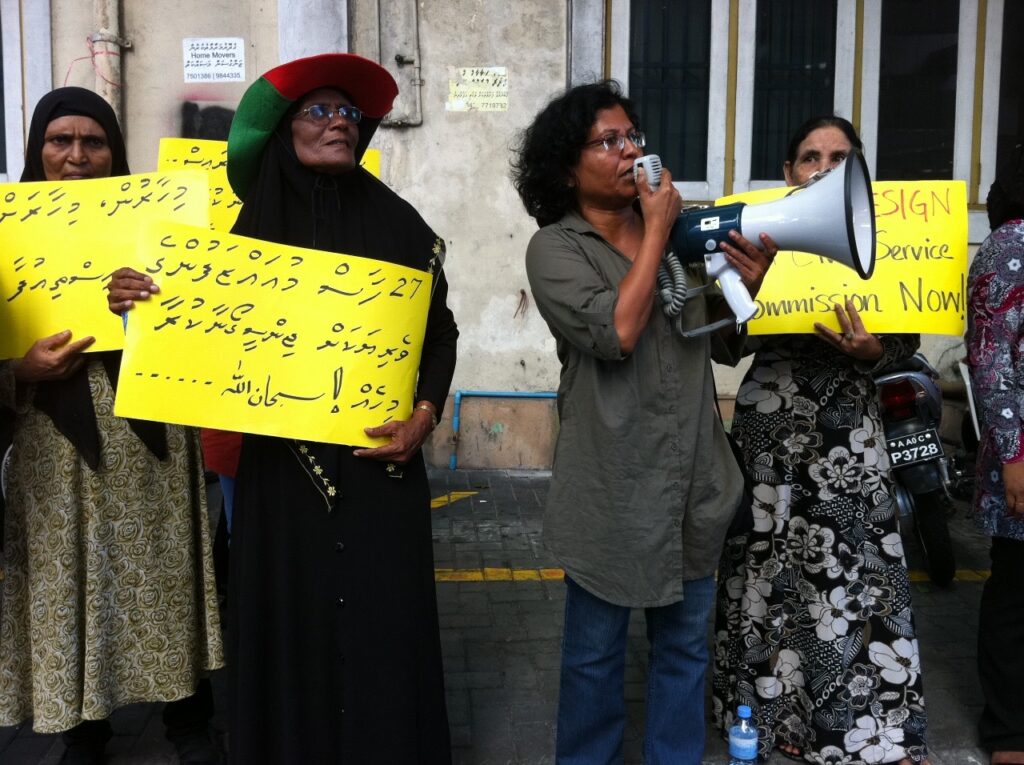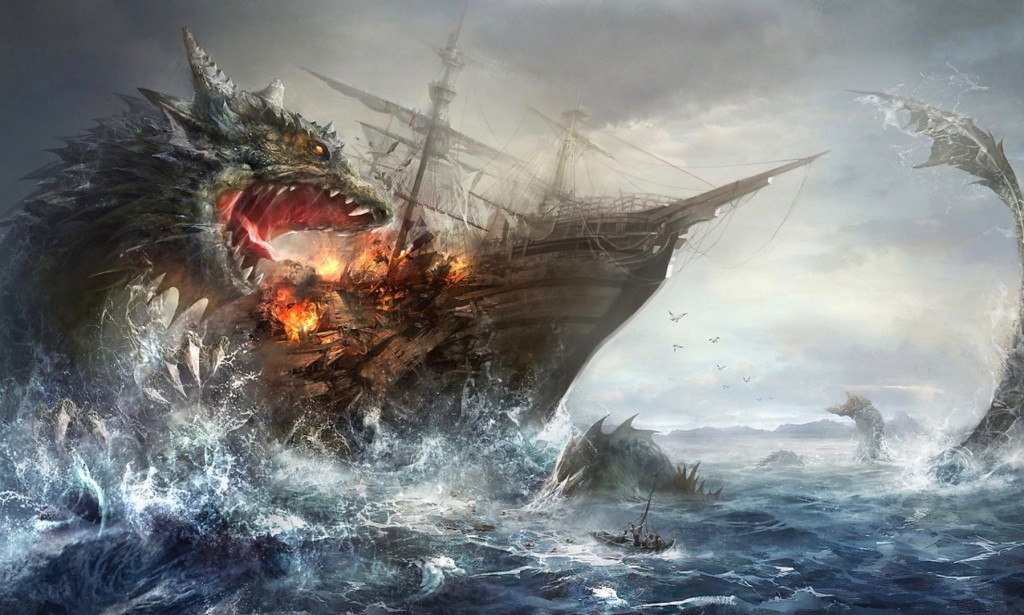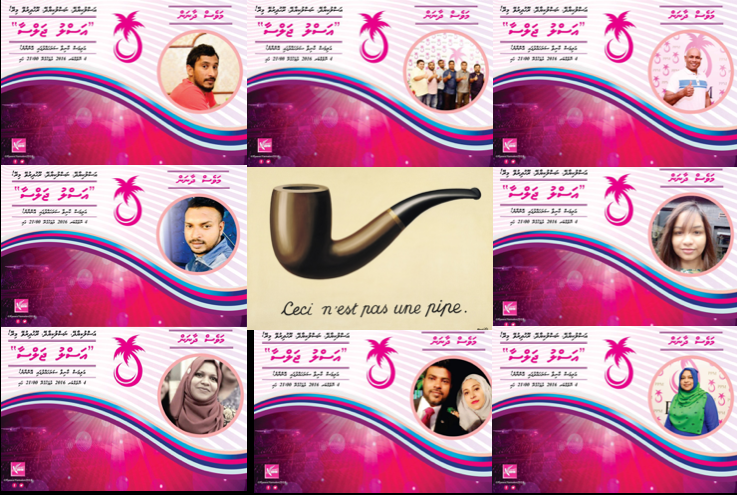Honouring Aniya – in memorium (1966 – 2023)

Independent, principled, uncompromising, fearless and fiercely committed. These are just a few adjectives to describe the amazing qualities of one of the most formidable women activists in the Maldivian media, politics and public life. She is the unforgettable and admirable Maldivian woman warrior, Aishath Aniya. Gone at 57.
Aniya sadly departed the battlefield of our earthly persisterhood on 20 August 2023 after a short illness, succumbing to cancer. One year has passed since her passing. The silence of her absence resounds in the Maldives, especially among those who value her unwavering qualities and inimitable contribution in a conservative, patriarchal, misogynistic and increasingly hostile environment to women – especially those in public life.
She is a woman warrior that must go into the country’s history books, for she fought on many fronts. As a mother, teacher, educator, journalist, broadcaster, pro-democracy activist, human rights defender, women’s rights defender and a staunch defender of the media and our constitutional rights to freedom of expression and assembly. Her social and political activism spanned across fast-moving historical changes in the Maldives in the early 2000s. From deadly authoritarian persecution and dictatorship to the fleeting hopes of democracy in the late 2000s, and back again to the darkness of uncertainty, insecurity and instability in the present time. She invoked the wrath of political conservative ‘clerics’, becoming the target of their harassment for questioning the alleged requirement to wear the hijab for women in a nation that had an Islamic history for centuries without this practice.
Throughout these social, cultural and political convulsions, Aniya weathered the political scene with dedicated commitment to the Maldivian Democratic Party (MDP). She was an active party member, administrator and organiser, coordinating and managing women-led grass roots street protests for MDP during its toughest trials. She confronted state lawlessness and police brutality with fearless conviction and pragmatism, suffering imprisonment and the inhumanity of being strip-searched in police custody. None of this broke her formidable spirit as she continued to fight for her democratic beliefs, in the pursuit of human rights, dignity and freedom. She fought with her body, her voice and her pen. Despite this commitment, Aniya found herself compelled to leave MDP a few months before her passing. She could no longer recognise what it stood for as the party became riddled with infighting among its leadership. She was always the principled woman. Like many loyal party members, leaving MDP is something she never imagined she would have to do. But that is the present reality of the landscape of democracy in the Maldives, which Aniya was a foundational part for at least two decades of her life, cut short too soon by cancer.
Through the toughest and most insecure times for journalists in the Maldives in the early 2000s, Aniya worked for the pro-democracy newspaper Minivan News. During the 2010s, the Maldives moment for democratic hopes rose briefly and fell back into authoritarian regression. At this time, Aniya held together a radio station, Minivan Radio, that continued to provide the public with sharp critiques of a lawless government with institutions operating with impunity against dissenters. Under great personal threats from the most unsavoury and dangerous operators in the Maldives’ political scene, rampant with conservative Islamism and political gangsterism, Aniya chose to forge ahead, unfazed.
Subsequently, when the space for independent media shrank further, Aniya took to the social media application Clubhouse where she curated a space and gathered a loyal audience to whom she provided her analysis and insights into the day’s politics. She had no funders. She was always giving, not taking. Always principled in her deep belief in human dignity, freedom, humanity and love for the Maldives. Her country. Her people. She continued to fight the good fight, until she could no longer use her voice through illness. And then fell silent forever, a silence and loss still felt.
Aniya’s contribution to the Maldives political scene as a fearless critic of the establishment is undeniable, uncontestable and in my opinion, absolutely admirable. This is why her absence is so acutely felt as Maldives went to the polls to elect the country’s next government in September 2023. Aniya’s departure means that Maldivians, who relied on her sharp political analysis, are suddenly bereft of these insights.
The absence of her fearless vocabulary of dissent leaves our media weaker. Her capacity to call out those deserving such treatment in no uncertain terms, based on her deep knowledge and experience of the country’s socio-political landscape and its many questionable actors is an irreparable loss.
With her departure, Maldives has lost a national treasure. That is what Aniya’s loss means to me. She is irreplaceable. She left us too soon, too young, with too much still to do. I was hopeful that she could run for the Peoples’ Majlis in 2024. It is a place lacking principled, committed, fearless and good people like Aniya. But that is not to be.
Aniya leaves behind a family, children and grandchildren. She leaves behind many friends and compatriots who feel her absence and the unwelcome silence of a cherished dissenting voice of reason and humanity.
Thank you Aniya for all that you were and for all that you did, taught and gave to the Maldives.
You will always be remembered as an inspirational woman warrior of our time.
إِنَّا لِلَّهِ وَإِنَّآ إِلَيْهِ رَٰجِعُونَ
20 August 2024
Humay Abdulghafoor
Photo: Aniya protesting with a group of women outside Velaanaage government offices, calling for the resignation of the then head of the Civil Service Commission, Mohamed Fahmy Hassan, after allegations of sexual harassment against him came to light. 2012.

